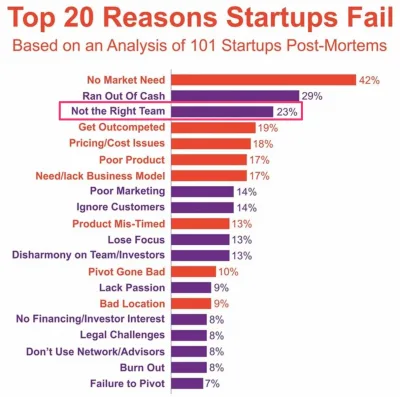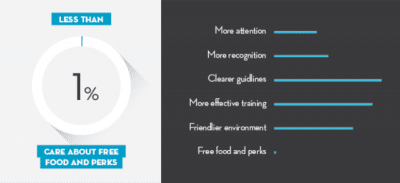There are A LOT of startups around. This means when you’re recruiting, you really need to distinguish yourself in order to woo the best talent.
Unfortunately, the best candidates won’t necessarily be flocking to your company. You need to come to them.
What’s more, you don’t want to assemble the wrong team, as displayed by the graphic below:

So let’s begin!
1. Enhance Your Employer Brand On Social Media
LinkedIn reported that 72% of recruiting leaders agree that employer brands have a significant impact on recruitment. Don’t side with the modest but unenlightened 28%; strut your stuff and show off a bit.
It’s important, however, to remember that your humble bragging should correlate with reality. If your company isn’t as advertised, post-hire, you’ll only have to hire again when the new hire flees in horror.
LinkedIn conducted yet another study that highlighted 75% of candidates review an organisation's reputation prior to submitting their application to the hiring manager. Who are the remaining 25% who like to play Russian roulette with their futures? We may never know. Regardless, this means you need to flex your real-world perks and achievements to the majority, on social media. Some view recruitment as a sort of a sales process, where you ‘sell’ your vision. This might be a little off. People judge your organisation by its actions, and that means you need a strong reputation that practically sells itself.
But it doesn’t sell itself, which is where social media marketing comes in. LinkedIn is fast becoming ‘Facebook for professionals’. This gives you plenty of wiggle room in terms of the tone of your content. You can be candid and casual, talking to the public on a personal level, discussing why your way of doing things enhances the employee experience, through engaging posts that celebrate your company culture and achievements. What have you done well lately that you can boast about? Share photos showing off everyday life in your work environment, organise office open days, create an office video tour and present your empowered employees and company culture on social media.
2. Offer Career Progression Opportunities To Woo Top Talent
Career development is soaring in importance among job seekers, with many seeing its absence as a dealbreaker when accepting an offer.
They want to know they can grow with you. Signal this at the very beginning of the recruitment process, with the job ad. Good salaries and a competitive benefits package are almost a given; all the top companies will offer this. Show potential new employees the unique opportunities and perks you can provide them to develop and thrive at your company. Your recruitment strategy should draw their attention to their predecessors’ career trajectories, for inspiration and offer senior shadowing opportunities to give them an idea of what their career could look like at your startup, down the line, beyond the job description. Perhaps you can get in early and give great candidates a taste of these experiences during the onboarding stage.
Self-motivated employees are necessary to propel startups and are also the ones who actively seek out further developmental opportunities. Startups can offer an untapped source of opportunity to learn, but if a position’s responsibilities become too limited or the company stops growing, those opportunities fade away. How can your company offer continuous learning and keep the right talent engaged in their duties? We’ve all felt empowered by a sense of ownership over our work. Trusting team members to take responsibility for their own work not only encourages engagement but also creates a self-sustained process in which they feel truly connected to what they’re doing.
3. Provide Unique Perks and Benefits
I'm not talking about office tabletop games, alternative inflatable seating arrangements, or expensive, left-of-field lunches. These perks lose their novelty quickly, with foosball tables collecting dust and vegan haggis menu options getting ignored.
To attract and maintain top talent, your company selling points must offer unique, genuine, and consistent value. These don't have to be costly, either, unlike the meat-free version of the Scottish delicacy.
Flexible working is a much-talked-about benefit at the moment due to the pandemic, and it’s not going away anytime soon, so be sure to incorporate it into your offer. But your benefits can’t be limited to the ability to work from home. Sure, it’s fashionable, but your perks need to be geared towards overall wellbeing. They're not a resource like artificial intelligence - they're people.
Demonstrate your company’s commitment to employee wellbeing, whether you're a small business or on the larger side, by pointing out your mental health resources utilised by your current employees. In addition, team events are a great way to switch things up a bit, boosting morale and cultivating a company culture of unity. Did anyone say bowling?! Bring up your amazing staff socials during the interview process and figure out a way of saying you like to work hard and play hard without actually saying those words. Gym passes are always well received by potential candidates, too, seeing as working out can be expensive. Offer valuable benefits to stimulate employee engagement and retain valuable team members.

4. Refine Your Company Culture
In another LinkedIn study, 25% of candidates said that better company culture was among their top reasons for changing jobs. In modern times, strong company culture is often defined as openly showing you value your employees, regardless of rank. Collaboration, constructive feedback, and transparent communication are the most sought-after attributes among job seekers. This means you need to listen to existing employees if they have good ideas and don’t be afraid to act upon them, even if they’re terrible ideas (only joking). Treat people well, empower them and provide everything they need to grow and develop. Have your team members give testimonials describing these constructive conditions on your aforementioned website and social channels. As the adage goes - photos, or it didn’t happen.
FREE DOWNLOAD - ULTIMATE HIRING CHEAT SHEET →
Offer your team a greater degree of autonomy. You want your culture to embody an open-minded and forward-thinking approach, matching your competitors. Are you allowing your team to dress casually? How about a customary day off on their birthday? These all contribute to a winning company culture that potential new hires will want to be a part of. Highlight these traits throughout the hiring process and you’ll definitely start to turn heads.
5. Have A Compelling Founder Story
This influential and often highly visible figure must embody your company values and act as the protagonist for your company’s origins story, just like Batman. People love a good story. An inspiring narrative will capture job candidates' imaginations. That's because potential employees generally like to relate and empathise on a person-to-person basis; “I like the sound of this guy; he reminds me of me!”.
So, make sure your leader is presented in an interesting and charismatic light. Have your website and social channels depict them, via videos, images, and articles, as the sort of person who can motivate and inspire. They don’t necessarily have to wear a black turtleneck. Just make sure they can drink a glass of water on camera without looking weird (or deprive them of water for the duration of the shoot).
The Takeaway
Hiring is increasingly employee-centric. That means it’s crucial to make professional development central to your recruitment process, and specific to the individual you're considering hiring. Use your company culture to make them feel special. That way, you’re keeping up to date with the recruitment landscape, which has seen job seekers maintain a heightened sense of entitlement when it comes to what they expect from a new work environment.
Good company benefits aren’t enough anymore. To stand out, show job candidates you're modern and forward-thinking and pander a little. If they’re genuinely talented - something that’s in short supply - they’ll be worth the effort.
One final note - it’s a fact of life that startups need to prove themselves when hiring. Your company record isn't necessarily evident, especially if you’re a fairly young company. Potential recruits are hiring based on potential and goodwill. Don't neglect to hire based on their potential, as well.



![How to Hire a Remote Software Developer [ Step-by-Step Guide ]](/content/images/2022/04/iStock-1163541557.jpg)
![9 Zoom Interview Questions to Ask Software Engineers [ Recruiter´s Guide ]](/content/images/2022/04/iStock-1319790212.jpg)
![What is the Average Software Developer Salary? [ For Startups ]](/content/images/2022/03/iStock-1017296544.jpg)
